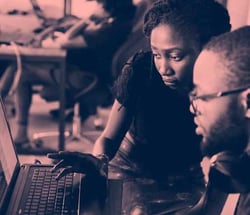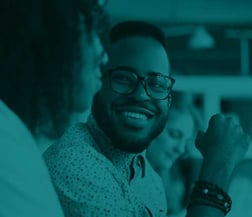The process of learning is more complex than most people consider. We're really fascinated by the topic of unlearning. We first wrote about it here - unlearning is the new learning. In our experience, once the baggage of unlearning is dropped, learning and performance improvement can be turbo-charged.
Why is unlearning important?
Steve Wheeler, associate professor of Learning Technologies at Plymouth University, has an interesting perspective on this too. In a blog - Learning, unlearning and re-learning, he quotes:
"Times are changing. Kathy Sierra features a timeline on her blog which suggests that the 1970s and 80s were about how well we could learn, the 1990s and 2000s focused on how fast and how much we could learn, whilst today's education should be based on how much we can unlearn."
Let's look at how we can address unlearning as part of the learning analysis phase of the eLearning design process.
'Don’t wanna learn from nobody what I gotta unlearn.’ So sang Bob Dylan, in a song from an album called Slow Train Coming (not, as you might expect from Dylan, Slow Train a-Comin’). This was another album which forced his many fans to unlearn some of their own learning about him. I should know, I got it for my 13th birthday.
This nasally delivered born-again evangelism wasn’t what I thought I’d signed up for when, a year earlier, I fell under Dylan’s spell. So, I stopped buying – i.e. asking others to buy me – any new Dylan albums for a while, and listened only to the old ones. Given that much of the 1980s was a creative nadir for Dylan, this wasn’t such a bad idea.
But it’s only in recent years that I’ve come to share Leonard Cohen’s assessment that this was great gospel music. I missed out at the time because I wasn’t willing to unlearn. Thankfully, I’m younger than that now.
Unlearning and association
The mind works by association – at least, mine does. So I often find this line of Dylan’s flitting through my head these days. Resistance to learning interests me: it’s the thing I have to devise ways of overcoming as I sit at my Logicearth desk, instructionally designing eLearning courses.
As well as meetings with subject matter experts (SMEs), I will try to schedule a call with some of the learners I’m writing for. Usually they will be handpicked by the client, and so – in their eagerness to learn – not wholly representative of the wider learnership (a word I only wish I had made up). Still, these calls are vital.
We all have an ideal learner in our head, and this easily-pleased and eager-to-please little head-occupant needs to be evicted. You are going to have to work harder than you think. As I’m finding out for myself …
Right now, I’m in the middle of doing some unlearning, having agreed to go with a friend to guitar lessons for beginners. It’s teaching me about learning as well as guitar-playing (hence this blog). My guitar-wielding days actually began at age nine, and I’ve barely progressed since.
Why?
Mainly because my first learning experience was a bad one, and also because my desired learning outcome (to be – not just to be like – Jimmy Page of Led Zeppelin) was a little unrealistic. And then, once the reality-penny dropped and I saw how slow my progress was going to be, I found a way of playing that was enough to get by on. Enough that, if someone asked ‘Do you play the guitar?’, I could answer ‘Yes’ – as long as there was no guitar around for me to (dis)prove this.
If I can stand it, I’ll revisit that first learning experience. My teacher was a family friend (I’ll call him Mr D), a headmaster who was a reluctant teacher that day. He taught me, with some difficulty (the difficulty was mine), the chords E and A, and brought out The Beatles Songbook. With those two chords you can do a passable version of Get Back. A good start: I liked The Beatles and knew the song.
When it comes to learning, the new is built on the familiar old – not everything has to be unlearned.
But my interest in language, even at that age, was at least the equal of my love of music. And so I quizzed Mr D on the lyrics. Why did Loretta Martin think she was a woman when she was a man? Why did he have a woman’s name, then? In the line ‘But she gets it while she can’, what is ‘it’? Mr D shifted uncomfortably in his chair, and asked his son to take over. I was then treated to a display of Mr D’s son’s virtuosity with the instrument. Suddenly, air guitar seemed a better option.
But worst of all was what followed next.
When my mum picked me up and asked Mr D ‘So, is he going to be a great guitarist, then?’, there were some mumbled words of affirmation, but they were accompanied by a shaking of Mr D’s head, just caught out of the side of my eye.
And so the pronouncement had been made: I would never be Jimmy Page. I wouldn’t even be Ritchie Blackmore.
Unlearning in the eLearning content design process
Here at Logicearth, we always enquire into the difficulties that learners might face by asking our SMEs:
‘What are the pain points?’
Well, my pain points when my mum picked me up were painful indeed. Looking back on the experience, what does it tell me about learning? It teaches me that learning requires:
- Some initial willingness from the learner (even the horse that was reluctant to drink agreed to be led to the water)
- A lot of effort to engage the learner (this effort can’t be deputised, e.g. to templates or technology)
- Realism, but not discouragement (nod don’t shake your head)
- No preconceived notions about ‘ability’ (skills can be learned, by anyone)
- Demonstration of the required skill (but not ‘showing off’)
- Acceptance that some Beatles lyrics are indecipherable (OK, strike this one)
And now, since Monday, my unlearning (and new learning) process has begun. It was different this time. For a start, I was part of a group, and so the incompetence wasn’t uniquely mine. Even though eLearning can take someone out of the classroom and place them alone in front of a computer/tablet/mobile, there is a skill involved in making the learning seem both individually targeted and a shared experience.
You can do this, for instance, by using scenarios involving the kind of characters the learner will recognise among his/her colleagues, while also addressing the learner directly as ‘you’ and leaving enough scope for personality (e.g. by asking questions that involve thoughtful, individual responses rather than right/wrong, true/false answers).
The song we were learning was Neil Young’s Desert Highway. A good start: I like Neil Young and know the song. But just as I was getting comfortable, I was told to use my pinkie when playing G (the third chord I learned aged nine). It felt weird, awkward. And just right! I knew from the discomfort – a good discomfort – that I was both unlearning and learning.
So, my advice is, don’t alienate the learner, but don’t make your courses too cosy either.
Unlearnin’ through e-learnin’ is a-comin’. Soon.
GET BETTER ELEARNING DESIGN
Unlearning is just one aspect of learning that we address in our eLearning content development services. Click here for more answers to your elearning challenges.










Was this article helpful?